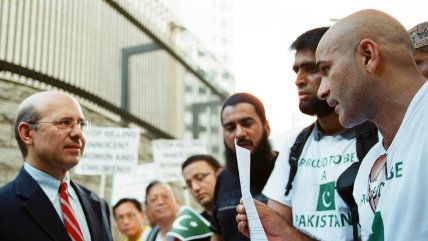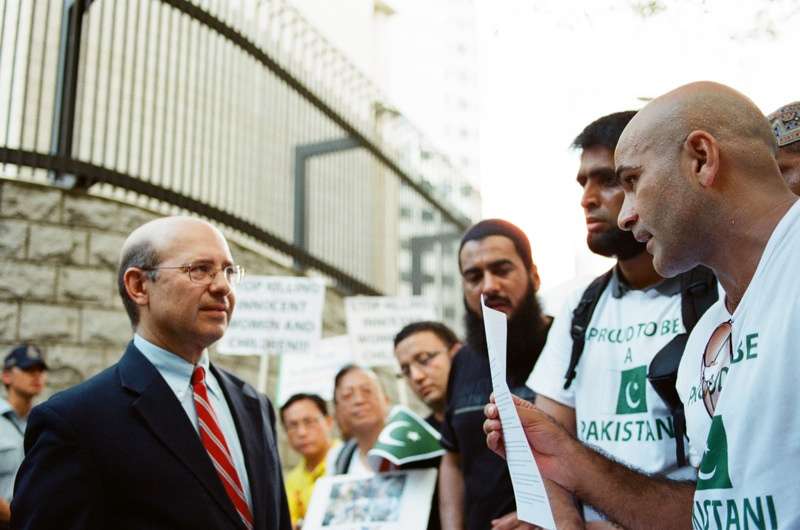The Phony Mystery of Why 'They' Hate Us
The explanation is far more political than religious.


What do Barack Obama and Donald Trump have in common? Among other things, they have—or pretend to have—no clue why some Muslims hate us. Trump says (I almost typed believes, but I'm not sure anyone, including Trump, knows what he believes) Muslims should be barred from the United States until "until the country's representatives can figure out what's going on."
Note that Trump includes himself among those who haven't figured it out, or else he surely would have told us. He either does not know, or does not care, why people are willing to kill Americans.
Let's give these members of the American elite their due: one has to work hard to make a mystery of anti-American (and anti-Western) terrorism emanating from the Middle East. It takes prodigious effort to maintain an air of innocence about San Bernardino and Paris, because no one who claims to be informed can plead ignorance of the long history of U.S. and Western imperialism in the Muslim world. This includes the CIA's subversion of Iranian democracy in 1953; the U.S. government's systematic support of compliant, autocratic, and corrupt Arab monarchies and dictatorships; its empowering of Iraqi Shi'ite Muslims; and its unconditional backing of Israel's brutal anti-Palestinian policies. (The savage 2014 war on Gaza killed many noncombatants.)
In the 10 years before the 9/11 attacks the administrations of George H. W. Bush and Bill Clinton bombed Iraq while maintaining an embargo, most especially on equipment for the water and sanitation infrastructure the U.S. Air Force had destroyed during the Gulf War. Half a million children died. This was also when U.S. officials promised, then reneged on the promise, to remove U.S. forces from the Islamic holy sites in Saudi Arabia.
From the air Americans routinely kill noncombatants in Syria and Iraq, most recently this week, when "at least 36 civilians, including 20 children, in a village in eastern Syria" were reportedly killed, according to McClatchy DC. Do Americans notice? Of course not. That's why San Bernardino and Paris can be made to appear so mysterious.
Things like this happen all the time. The U.S. attack on the Doctors Without Borders hospital in Kunduz, Afghanistan, was especially egregious against this background of war crimes.
The U.S. government has conducted war by remote-controlled drones since 2001 in a variety of places, including Afghanistan, Yemen, Somalia, and Pakistan. Do Americans have a clue what it must be like to live under the drone threat? You know the answer is no. But many Muslims do, and many others can sympathize.
Since the San Bernardino shooters both had roots in Pakistan, it might be worth focusing on the drone war there, part of the fight against al-Qaeda and the Taliban in Afghanistan. Steve Coll, in his Nov. 24, 2014 New Yorker article "The Unblinking Stare: The Drone War in Pakistan," notes that that country "has absorbed more drone strikes—some four hundred—than any other country." Coll writes, "Armed drones are slow-moving pilotless aircraft equipped with cameras, listening devices, and air-to-ground missiles. They can hover over their targets for hours, transmitting video feed of the scene below, and then strike suddenly." Most of the time, the remote "pilots" do not know whom they are targeting.
Obama has claimed that the drone war kills few noncombatants, but this is rejected by many authoritative sources, including, Coll reports, a team of NYU and Stanford law students who found that "C.I.A.-operated drones were nowhere near as discriminating toward noncombatants as the agency's leaders have claimed."
The kill estimates vary, but the totals are significant—to the families and friends, and to distant Muslims who see their coreligionists slaughtered while minding their own business.
What turns an angry and anguished Muslim into someone willing to kill Americans indiscriminately? That's a hard question to answer completely. But when violence such as that inflicted by the United States drives a Muslim to the most "radical" form of the faith in search of revenge, the explanation is far more political than religious. If terrorism were happening during peacetime, that might tell another story. But it is not.
It's not "moderate" Muslims who need to take the lead in ending terrorism. It's the U.S. foreign-policy makers, whose daily atrocities make targets of Americans at home.
This piece originally appeared at Richman's "Free Association" blog.


Show Comments (191)